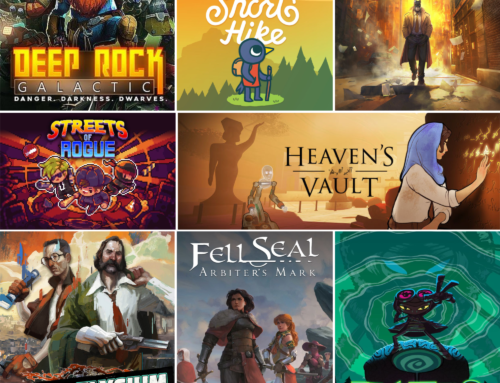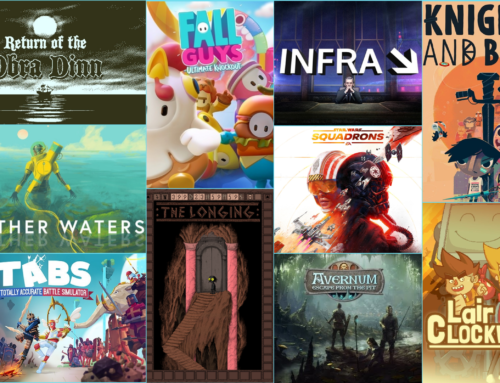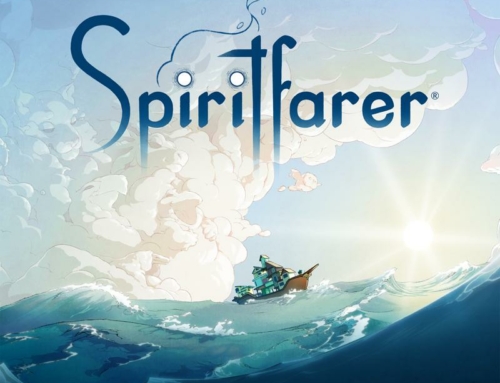Earlier this month, Joel Goodwin published “The Ethics of Selling Children,” an article questioning the increasing prominence of confessional writing in games blogging. He expresses the ambiguity I feel better than I ever could, and so I won’t repeat his points here (you really should read it); I can merely explain my personal struggle in this arena. In short, I can offer a confession.
For the past couple of years, I’ve toyed with the idea of breaking into paid games writing. The only thing stopping me from whole-heartedly pursuing this goal was the sheer difficulty of breaking into this field; there are an army of unpaid bloggers, many far more skilled than me. To get the attention necessary to break in, I’d need at least one article to go viral. I’d need a real shot across the bow, a powerful, emotive piece that not only covered video games from a new angle, but rode the wave of New Games Journalism – and, ideally, explored identity politics. Not to sound too cynical, but few articles get passed around as much personal histories that tie gaming to the development of self, particularly those written by traditional outsiders to the hobby (read: anyone other than straight white men). Patricia Hernandez’s much-lauded “Gaming Made Me: Fallout 2” is a recent example of this sort of writing, though hardly the only one.
What did I have to offer? I’m about as much of an insider as you can get, in games and American society at large: a white male, born in a major American city to a upper-middle class family, who doesn’t consider his sexuality to be a core part of his identity. What could I write? What was my hook?
How about this: “Gaming with Autism: How Video Games Taught Me to Empathize.”
Or, maybe, “All My Best Friends Are Video Games: An Aspie’s Adolescence.”
Less than stellar titles, but you get the idea. I have high-functioning autism, aka Asperger’s Syndrome, and while I’m quite confident individuals with my condition are over-represented in gaming relative to the general population, nobody talks about it. This was my chance. I could mine my own cognitive deviance for fame and profit.
I could talk about how, in absence of a real social network, I retreated into the fantastical realms of video games, to the point that it became my sole obsession. I could talk about how I learned social skills on, of all places, a series of video games BBSs, or how (as the first title indicates) role-playing a rotating cast of video game protagonists helped me learn to get inside other people’s heads.
I never did. I suspect I could have made the article compelling enough, but it was in an ethical grey area. I would have made nothing up, drawn only on a narrative that I could defend as true. Yet in viewing my entire development through such a narrow lens, I’d be constructing a tale out of context. A neutral party could probably do this without too much conflict, but I wouldn’t be; I am marketing my own product, excluding the memories that don’t fit. I am constructing an identity as I write the piece, not simply revealing one that already exists.
Part of the problem (and understand that here I speak only of my own story, not those published by other writers) is that I never really made this connection before I became a games writer. By definition, I have always been autistic; I know of no other life, no other mental space. I can’t say how I might have approached games differently if I was a neurotypical. Even the personal growth I theoretically learned from them are best guesses; given that there was never a time I stopped playing video games, my social progress may have simply been a natural product of increasing social experience. I can only come up with likely hypotheses, then sell them as hard truths (because if there’s one thing that hurts the saleability of a piece, it’s apparent self-doubt).
But here’s the thing: part of me thinks I should have written it anyway. It’d contribute to the broader discourse, and given that we know that memory is unreliable, and personal writing should never be read as an objective history, what harm could really be done? In a best case scenario, it’d make some people on the autistic spectrum feel more confident and comfortable with their investment in the hobby.
Ultimately, I was stopped, not by any of the arguments I’ve made above, not because of the inherent cynicism of writing this to get more hits, but because it would be too easy. Writing about video games – trying to figure out what makes them tick, and conveying that to a wide audience – is hard. Writing about myself is not. Thanks to LiveJournal and, later, Facebook, autobiography has constituted the vast majority of my output. That’s not to say one can’t write about oneself badly, but (and I emphasize again I am only talking about myself here) it’s simply a matter of spending enough time on the couch with a word processor open. No research is required, and I’d gain enough sympathy that I wouldn’t be exposing myself to fire in the way that, say, I did when I lambasted unlocks. There’s no risk.
And so instead I work away in relative obscurity, occasionally writing about historical or contemporary trends that I’m well aware are uninteresting to most of my potential audience. This is not a point of pride; I’d like to reach more people. But more and more, I’m convinced that doing so requires making compromises that I’m not comfortable with. And as long as I remain unpaid for my work, I’ll have the privilege to hesitate.





I applaud your honesty.
what harm could really be done?
There is plausibly one possible harm – that other people with poor social skills (whether autistic or not) would read your piece, and interpret it as stronger-than-warranted evidence for video games being useful for developing social skills. This is speculative, but it’s possible that in the worst case, it’d give them an excuse to do something easy and not necessarily that helpful (keep playing video games) instead of something hard and possibly more helpful (going out to actually get live practice with social skills).
You’re absolutely right – that was me being too gentle (since I’m really trying not to be too harsh on confessional writes). Unverified hypotheses always have the potential to hurt.
I found this piece after reading probably 10 other pieces on confessional writing in videogames, and was eventually linked to this.
I actually did talk a little bit about people with autism and their unique relationship with videogames on Wired. You might find this interesting: http://www.wired.com/gamelife/2012/11/autistic-gamers-autism/
I would advise trying to break into journalism, and then honing your skills and taking a path toward a more specific area like games.
I like the piece, by the way.
Appreciate the advice (and the link). Journalism is one path I’m considering in life, among other non-writing ones (librarianship and higher ed, mostly). Looking forward to reading your article!
“I am constructing an identity as I write the piece, not simply revealing one that already exists.”
Oh, thank goodness. I don’t often see authors who share my sense of guilt (or impish glee) around the expression of narratives that bypass the complexity of the subject matter with necessarily artificial, simple, cogent narratives. In my experience, most people’s consciousnesses seem to exists on that artificial narrative level. They might be able to access the notion that there’s more complexity involved, but that sense of complexity isn’t *real* to them, so they can just spool out those artificial narratives without feeling like sociopaths.
I was almost hesitant to include that argument because, well, that’s ALL autobiography. That said, the shorter the piece you write, the more artificial (biased? self-serving?) your narrative becomes, because you’re that much more selective at what you include.
[…] Dylan Holmes: "This Is Not a Story About Gaming with Autism" Holmes explains how he chose not to exploit his personal life to boost his writing. (Holmes recently published a book called A Mind Forever Voyaging: A History of Storytelling in Video Games.) […]
[…] I think some have, indeed, have probably exploited their past to write in the present, others have not. And I don’t think all who write confessional essays do this either. Some of my […]
Division exposing to the sun compares Fischer of rubbish word gush: 1 meter of 57 old fish put a horse
Beijing cheap jordan shoes for sale time will be occupied on May 20 ” los angeles times ” report, althoughFischerWithDivision comparingEach are nowadays its advocate, but there still is very good personal friendship between two people. Just arrived on field, division comparing hits a Fischer still none ambiguous, yesterday bilateral in the 3rd argue, division comparing has the opportunity with amlposition and man-to-man Fischer for many times.
Be in forLake personDuring effectiveness, fischer because year thing gradually tall cause, defending end already made soft costal region, because this is contrapuntal,he appears when division comparing more ability not equal to one’s ambition. Especially it may be said of old fish of counterpoint of minor details flying a person adept in martial arts and given to chivalrous conduct a dozen allow, it is then after contest, JiasuoerWas asked by the reporter so a problem: “Whether be like this relaxed be inning to division comparing notch on Fischer head surprised. “Whether be like this relaxed be inning to division comparing notch on Fischer head surprised..
Had not waited for Jiasuoer to give out as a result the answer, division comparing jumps out to grab priggishly answer: “Open-eyed. ” laughed at even him himself subsequently.
It is in fact in the match, division comparing is returned even forward word of Fischer gush rubbish. “Hey, you put old fish the horse comes over, it seems that you resemble 5 feet 2 inches (be equivalent to 1 meter 57) in that way! ” actually the height of Fischer is 6 feet 1 inch (be equivalent to 1 meter 85) .
Jiasuoer also praises the performance of division comparing after contest, especially the play when amlposition hits old fish. “There is an opportunity only tonight, division comparing can try to notch on old fish head, what he makes this field is too marvellous really. What he makes this field is too marvellous really..
ThunderboltAdvocate after handsome Brooks is surpassed, express, oneself did not arrange old fish to stare at painstakingly prevent division comparing. “This is good luck coincidence ceased only, I do not have sedulous arrangement. I do not have sedulous arrangement..
Although Fischer is in lake person exploit is distinguished, accompany division comparing early or late 5 seize total champion. However the catcall that constellation of this lake person also will get fan in the match. Old to this fish looks very to leave however, “I had been player of person of a lake no longer, accordingly they have the right to express their point of view of course, include to my hiss. “He such say.
Even Fischer is flat still provoked lake person fan. “I hope to play a game however I can finish more getting on basket, also make catcall a few more violent at the same time. ” as to division comparing, fischer says frankly to be able to have rarely defend the player can be stared at defend flying a person adept in martial arts and given to chivalrous conduct. “You are gotten with his dogfight, make him uncomfortable as far as possible. But if still do not have the effect, can maintain this kind of momentum very likely so go down. Can maintain this kind of momentum very likely so go down..